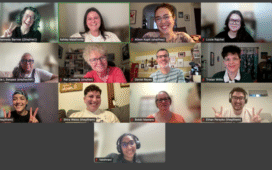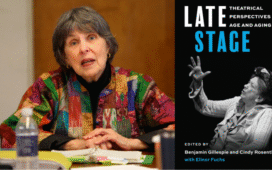Build the Reason for the Trip
A good journey requires a good amount of planning, and each theatre organization I work with requires a different journey. A search for an artistic director at Baltimore Center Stage should not be the same as the one for Theatre Latte Da, though the structure of the search process might be the same. We all have to make certain stops on the trip (stakeholder meetings, a job description, interviews), but how we get there should be curated and crafted based on the destination: placing a leader who can allow the organization to thrive.
Our work as consultants is to provide some direction to the search committees, staff, and boards that we work with and justify why we have chosen that direction. This does not mean that we are not open to input; in fact, we need it in order to make the trip better. The grounding that we can provide organizations lays the foundation for a good journey and process. They have to know where we are going and why, or else everyone will want to take a different trip.
Functionality. Not Personality.
If I had a quarter for every time I heard a search committee member ask me to find someone that “shines,” I could pack my bags to a villa in Spain and never see a piece of theatre again. Shine and sparkle do not help as descriptors of a good leader. It is why our approach at our firm is that leadership is a functionality and not a personality. Don’t get me wrong: you need charisma and influence, but those are sharper words than shine and sparkle.
Functionality of leadership struck me as a concept in graduate school. There is a course called Functions of Leadership which is broken into three key sections:
- Direction: a leader establishes a direction. The person makes choices about what will be the organization’s focus and purpose.
- Motivation: securing the essential efforts and resources for the organization’s success. This is an economic imperative. It is choosing where your finite amount of energy, time, and money will be spent in relationship to competitors.
- Organizational Design: how should the company be structured in order for people to communicate effectively? Companies are essentially a group of people pooling their resources together.
These three functions, once learned and practiced, typically yield a skilled and experienced leader. But staff and boards of theatres do not often speak in these terms. We have to be more precise about the kind of people we want to lead our companies in the future. It is the most consequential choice a board will make for not only its staff, but the community it serves. The clearer we can become about the different functions we need out of leaders, the less we can rely on personality and likeability to be the determining factor.
If you focus on the shine and sparkle, you might miss something more meaningful, intricate, and necessary for your journey. So save the shine and sparkle for the beach and fireworks, but not when hiring leaders. They are sometimes in the places you would expect…and sometimes not.
The more that we can consider ourselves a collective whole solving a collective problem with exceptional leadership placement, the brighter our future will be.
Something Bigger
No theatre operates in isolation, and no search journey does either. We are all connected within this field and to the world around us. For me, the reason that a search can help make an organization better is that better leadership can bring in better talent, which can lead to even greater success in artmaking. Our field needs great leaders, and we need leaders who will tackle the challenges of this epoch. When Greg Kandel’s firm placed leaders like Garland Wright and Maria Goyanes, they placed torchbearers who could guide us through the dark days. Garland understood the Guthrie Theater and knew it needed to return to its original mission and structure, which included an acting company. Maria kept and departed from the founder’s legacy that allows Woolly Mammoth to continue to be a force in the American theatre. That’s what great consulting can and should do.
We should have a much larger conversation around this subject as there is much more to explore: how do we prioritize care for the client and the candidates? How do you acknowledge various power dynamics without hurting people’s sense of self-worth and purpose within an institution? How can you compare candidates, and what qualities and competencies matter when choosing a leader? Can we hire folks who may not know theatre, and if we do, how can we welcome them in better? What are the ways to foster good partnerships between artistic and managing directors?
With all the upheaval that faces our industry and the reckoning of the past fifty years, search will become an essential part of how change occurs in our field. It is the next generation that will have to craft the new model over the next several decades. The more that we can consider ourselves a collective whole solving a collective problem with exceptional leadership placement, the brighter our future will be. All search journeys require some level of success and achievement, setbacks and conflicts, and, hopefully, clarity of purpose. This is the kind of world we should aim for our theatre and organizations. And the right leadership, careful and considered, makes all the difference in the world.








